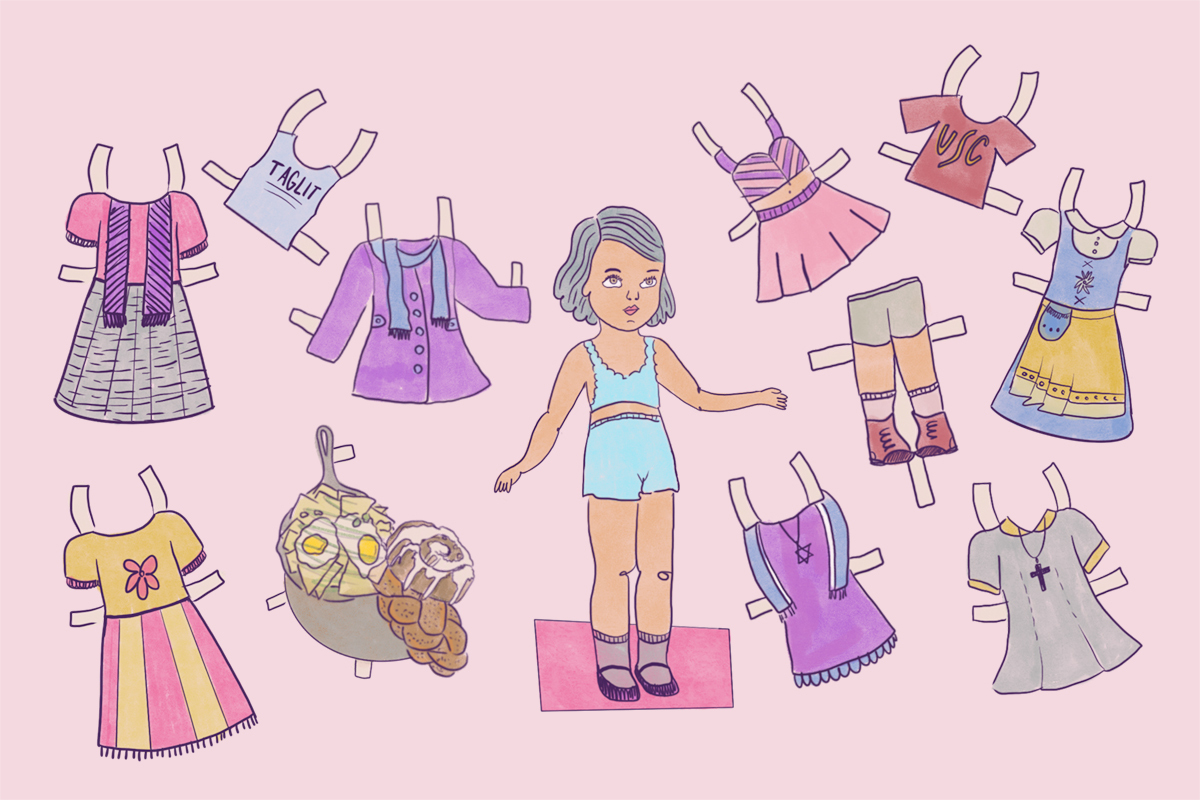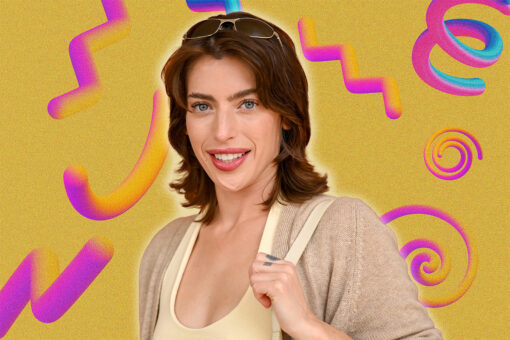In 1944, towards the end of World War II, the Mexican army assigned my abuelito, Juan, and his platoon to Europe as a back-up to the Allies. During their off-days, the platoon globetrotted through Europe — London, Amsterdam, Prague, and later Stockholm. A few hours before they returned to their post in Paris, the platoon stepped into one of Sweden’s most famous bakeries, Sundbergs Konditori, to set their sights on their cinnamon rolls. But, just one look at the lovely curly-haired maiden behind the counter was enough for my grandfather to fall in love.
My grandfather left the bakery with a cellophane-wrapped bag of pastries and my grandmother’s address, the latter of which he sent letters to for a year straight after returning to Mexico. A year later, my grandfather returned to Sweden to propose and bring back his future wife to his home country, only to find out that she was, in fact, Jewish — an anomaly in one of the most strictly Catholic nations in the world. But, my grandfather, ever the sweetheart, took the risk by converting to Judaism and raising his entire family in the Jewish faith in Mexico City.
Unlike my grandparents, my parents were stuck between their respective religions. They met at my mother’s soccer practice, in a slum right at the outskirts of the city center of Mexico, where my father was immediately taken by her brown eyes and long legs. To win her over, he took her to a cinema screening of Grease, where they held hands inside the popcorn bowl and shared a butter-y kiss. But, the illusion came crashing down when my maternal grandmother discovered that my father was Jewish and not Catholic and banned my mother from seeing my dad.
My mother, in her rebellious spirit, eloped with my father and moved to the United States, where they proceeded to raise three children, only to hit a rut in trying to understand in which faith to raise us. My mother was raised in a devout Roman Catholic household, belonging to a tight-knit Spanish-Mexican family who lived near the Basilica of Our Lady of Guadalupe. My father, on the other hand, was a Swedish-Mexican Jew whose hazel-green eyes, curly hair, and reddish freckles were peculiarities in a country biased towards tan skin and the Catholic faith. But, instead of being raised in an interfaith family, I was given no option but to follow my Catholic journey after my father handed over the reigns.
Growing up, I always knew what “Jewish” was, but never to the extent of how it could apply to me and how I myself had a right to that heritage. I was raised under the guise that I was solely Catholic, and my parents’ constant moves to Mexico City for half of the year reinforced my indoctrination to that faith. Never once was Easter Mass followed by a Passover seder or the Christmas tree placed next to the menorah, let alone did we have a loaf of challah laid out on the table during Friday night dinners.
My hometown of Villa Park, California was a burial for Judaism. Even if I could ever catch a glimpse of my Jewish faith, I was laden with the weight of Christian ideals and overwhelming whiteness that the townspeople preached. I attended Catholic school for nine years. I was the “goody two-shoes,” Rosa’s perfect daughter, the one with the highest Christian Service community service hours, a recommendation letter from the Orange County bishop, and the appropriate two-inches-above-the-knee plaid uniform skirt. Because of my Catholic upbringing and my tanner skin, I was never believed to be a Jew, and, with my father’s clandestine practicing of his faith away from our line of sight, I didn’t believe myself to be a Jew either.
I never knew my correlation to being Jewish despite the signs surrounding me as I grew up – my grandmother’s perfect Hebrew, my Aunt Rose’s Star of David necklace, my reading of Elie Wiesel’s Night, my sister’s kippah-wearing boyfriend, and my father’s kosher diet. While I was an overachiever in one religion, I was somewhat of a disgrace in the other.
When my parents divorced and then, later, my paternal grandmother passed away, I dipped my toes in Judaism through my father, who now freely practiced Judaism and found refuge in his Beverly Hills synagogue; however, I still kept my distance in the fear of disappointing my mother and the church that raised me.
Fast forward to college: I am accepted into the University of Southern California, the same college my sister, Caitlin, attended a few years back as a film production major. I was excited to tour the campus and even more thrilled to meet my fellow Catholic Trojans; I had made a promise to my mother to attend Sunday Mass until the end of my college career. But, a few months into USC, I noticed that the “enlightenment” I had once felt in my Catholic faith had slipped away completely, and I found myself completely alone.
This devastating loneliness lingered when my father passed away unexpectedly from a heart attack.
In my despair and lamentation, the first two stages of mourning, I graduated into shiva, where I had a garment torn over my heart, purified my hands by washing them, burned candles, and covered every mirror in the household. Our rabbi guided us through the steps, but my sister and I were the ones that carried out the entire process. I was heartbroken for my father, but more traumatized by the fact that I didn’t know him — and his faith — at all.
For a while, I had no idea who to turn to; so, in my pain, I took it upon myself to find that identity. I went through photographs of my father’s bar mitzvah, wore his silver ring engraved in Hebrew lettering, practiced Shabbat from Friday’s sunset to Saturday’s three-starred night, spoke to his rabbi one-on-one, and read every article known to humanity on what it means to be a Jew.
During my first semester of junior year, I eventually connected to my Jewish identity, finding comfort in the very faith that I was once deprived of. Although my hometown rejected this newfound religious choice (mostly because my entire neighborhood is Christian), I was never once looked down upon by my fellow Jews at USC (despite me having not been birthed by a Jewish mother). I was no longer toes deep into my Jewish identity, but rather completely enveloped in it. I was determined to latch onto every aspect of my new sense of self, and I found myself going to Hillel for Shabbat, signing up for Birthright, and celebrating the High Holidays. I even fell in love with a few Jewish boys here and there.
Now, although I no longer consider myself Catholic, but rather wholeheartedly and proudly Jewish, I will never ignore my Mexican-Spanish Catholic heritage. I currently have no plans on ever practicing my Catholic faith, but, having grown up in the magic and richness of Mexico City, I can’t help but understand how Catholicism is at the very core of my Mexican culture and that I must embrace its roots.
Lately, though, I’ve been researching the influence of Mexico City’s relatively unheard of Jewish communities and how most of Mexico’s most famous cities have become hotspots for contemporary Jews in search of their past. A few months ago, I was in Roma, the neighborhood now made famous by Cuarón’s Oscar-winning film of the same name, and I wandered to the entrance of a synagogue, one of few still standing in this location. I felt my dad’s presence there on that sidewalk, his once-beckoning finger calling 7-year-old me into the venue where I heard the Torah being recited.
It was in that moment I realized how our Swedish blood and Jewish background had once made me an outsider in a city I thought had nurtured me, as I didn’t fit the cookie-cutter label of Mexican-bred Catholics with lineages going back to the Spanish colonizers like the other girls in our neighborhood did.
But, it was also in that moment in which I realized I would never change my interfaith, multicultural upbringing for anything in the world. And, unlike my parents, I would revel in raising my children much more differently than I was brought up. Because, in my household, I will safeguard the importance of both of my faiths and my heritages, and I will raise my future kids in a Spanish-speaking environment with cinnamon rolls for breakfast, chilaquiles for lunch, and challah for (Friday night) dinner.
Header illustration by Fernanda Sanovicz.



